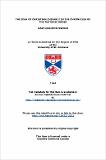Files in this item
The idea of Christian chivalry in the chronicles of the Teutonic Order
Item metadata
| dc.contributor.advisor | Ashcroft, J. R. | |
| dc.contributor.author | Fischer, Mary Christie | |
| dc.coverage.spatial | 312 | en_US |
| dc.date.accessioned | 2012-06-04T11:02:43Z | |
| dc.date.available | 2012-06-04T11:02:43Z | |
| dc.date.issued | 1984 | |
| dc.identifier.uri | https://hdl.handle.net/10023/2621 | |
| dc.description.abstract | This thesis has as its subject matter the chronicles written by members of the Teutonic Order to describe and Justify the crusades undertaken by the Order in Prussia and Lithuania in the thirteenth and fourteenth centuries. It argues that the full importance of this material has been largely ignored or misunderstood by historians and literary historians and hence that its contribution to crusading ideology has not been fully appreciated. It is then argued that the Kronike von Pruzinlant, the most widely disseminated and influential of the chronicles, was written in response to widespread criticism of the crusades and the military orders at the end of the thirteenth and beginning, of the fourteenth centuries, and played an important part in re-establishing the crusading ideal at a time of crisis for the crusading movement. The first section examines the Kronike von Pruzinlant in the context of crusading tradition and contemporary crusading literature and aims to identify the Order's original contributions to crusading ideology. The second section employs a diachronic approach. It demonstrates the Kronike von Pruzinlant's importance by contrasting it with an earlier chronicles the Livlandische Reimchronik, and a later one, the Chronicle of Wigand of Marburg. It also contrasts the two existing versions of the Kronike von Pruzinlant, the Latin original and the vernacular translation, examining the impact made by changes in the vernacular version on the form and purpose of the chronicle. The thesis concludes that the Order made significant contributions to the development of crusading ideology in the fourteenth century. Its development of these ideas reflects its desire to come to terms with the criticisms and difficulties facing the military orders as a whole at this time and points forward to its establishment during the fourteenth century as the foremost centre of crusading warfare in Europe. | en_US |
| dc.language.iso | en | en_US |
| dc.publisher | University of St Andrews | |
| dc.rights | Creative Commons Attribution-NonCommercial-NoDerivs 3.0 Unported | |
| dc.rights.uri | http://creativecommons.org/licenses/by-nc-nd/3.0/ | |
| dc.subject.lcc | PT230.C5F5 | |
| dc.subject.lcsh | Romances, German--History and criticism | en_US |
| dc.title | The idea of Christian chivalry in the chronicles of the Teutonic Order | en_US |
| dc.type | Thesis | en_US |
| dc.type.qualificationlevel | Doctoral | en_US |
| dc.type.qualificationname | PhD Doctor of Philosophy | en_US |
| dc.publisher.institution | The University of St Andrews | en_US |
This item appears in the following Collection(s)
Except where otherwise noted within the work, this item's licence for re-use is described as Creative Commons Attribution-NonCommercial-NoDerivs 3.0 Unported
Items in the St Andrews Research Repository are protected by copyright, with all rights reserved, unless otherwise indicated.


